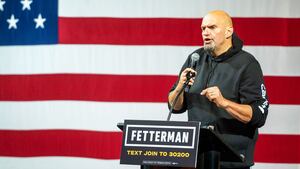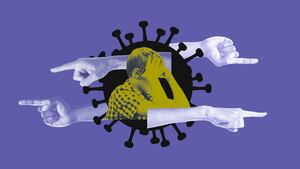You’d think we’d learn. Too often, when a scandalous allegation that fits the liberal media narrative emerges, it’s tweet first and ask questions later. Predictably, this approach has been known to backfire.
The latest example comes out of Brigham Young University (BYU), where racial slurs were allegedly hurled by a fan at a Duke women’s volleyball player in late August.
The only problem? One of BYU’s student newspapers couldn’t corroborate the claim, and a subsequent BYU investigation that utilized “all available video and audio recordings, including security footage and raw footage” found zero evidence to back up the accusation.
But for numerous mainstream media outlets with huge audiences, it was a story that was too good to check. The allegation was repeated as fact by The Washington Post, Sports Illustrated, and CNN, among others.
Action (and reaction) was swift.
The fan, who allegedly “yelled a racist slur at a Black volleyball player” was banned from BYU’s athletic facilities—before the university conducted its investigation. Utah Gov. Spencer Cox tweeted that “as a society we have to do more to create an atmosphere where racist a**holes like this never feel comfortable attacking others” (the tweet has since been deleted). Basketball star LeBron James tweeted his support for the alleged victim. And the University of the South Carolina women’s basketball team canceled games against BYU in response to the allegation.
But after BYU concluded an investigation in which more than 50 witnesses were reportedly interviewed (in addition to all the video and audio evidence), it could not corroborate the allegation—at all. The banned fan, described by one witness as “mentally challenged,” received an apology from the university and his ban was lifted. Sadly, and unsurprisingly, news of the investigation’s conclusion has received far less coverage.
But this is far from the only example of the media running with a story where horrific allegations are made, without doing the minimal amount of vetting.
One can look at the Duke Lacrosse scandal, the Jussie Smollett hate crime hoax, and the botched Covington Catholic story (to cite just a few examples) as demonstrations of the mainstream media’s tendency to believe (and advance) narratives that comport with their assumptions about the good guys and the bad guys.
Despite the embarrassing results, there is little reason to believe that anyone will be chastened for not doing basic journalism. Rather than contemplating why these mistakes keep being made, on Friday, The Washington Post wrote a piece explaining how BYU’s history of racism explains why the story went viral. Amazing.
Whatever happened to talking to sources and tracking down the video? How about expressing a healthy skepticism of any source that makes an explosive allegation? Why did a conservative student newspaper do the rudimentary reporting that scores of professional journalists chose not to?
Some of this surely has to do with the rise of social media and the “shoot from the hip” style of journalism that gets clicks and ratings these days. The old journalism maxim that “If your mother says she loves you, check it out,” has been bested by Ricky Bobby’s adage, “If you ain’t first, you’re last.” Some stories are too good to verify, and this is especially true of stories that confirm a popular media narrative. Rinse and repeat.
It’s worth noting that this phenomenon is not exclusive to liberals in the mainstream media. Conservative media are just as likely to fall prey to confirmation bias.
One fairly recent example was the NYPD’s Shake Shack hoax. In case you missed it, during the George Floyd protests in the summer of 2020, police unions pushed a story that police officers were deliberately poisoned by Shake Shack workers, and started throwing up. Upon closer inspection, the officers never got sick, the shakes were ordered on an app (so there was no way anyone could have known they were ordered by police), and the shake machines had just been cleaned (but apparently not thoroughly rinsed).
Ultimately, a police investigation found that there was “no criminality,” but not before mainstream media outlets (and yes, Fox News is a mainstream outlet) credulously reported the allegation.
Fox & Friends ran a segment claiming the officers had been “poisoned” and calling it a “horrendous attack.” Prominent right-wingers tweeted that police were “deliberately poisoned with bleach.” And another prominent (but fringy) right-wing blog wrote that “the left is killing our police officers.”
Other examples of conservative confirmation bias include some Fox News personalities’ baseless assertion that former DNC staffer Seth Rich leaked thousands of emails to WikiLeaks before being gunned down on a Washington, D.C. street, stories about cops going into comas after exposure to fentanyl, and the alleged murder of Kate Steinjle by an undocumented immigrant. (And it goes without saying that reports about the “stolen” 2020 election, to the degree they are credulously advanced, are the product of a similar “too good to check” ethos.)
It’s human nature to want to believe that bad people do bad things, and in today’s polarized world, someone from the other “tribe” is automatically assumed to be “bad people.” Conversely, someone from your own tribe is to be reflexively believed, without discussion. As a result, too many journalists often don’t do basic vetting of stories before launching them into the ether.
This negatively impacts trust in the media—which, you might have heard, is at an all-time low (and dropping further every day). What is more, by advancing stories that later blow up in their faces, ideologically motivated journalists are undermining their own cause.
The point of professionalism and institutions like the media is to rise above this nature. We, the fourth estate, are failing spectacularly.







